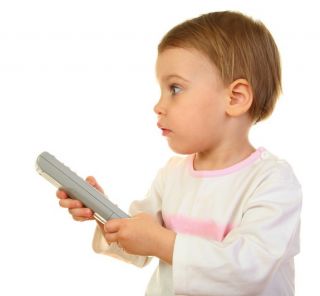Child Development
Babies Can Learn Better From TV Than Books
A child-development study charts toddlers' ability to pick up a new skill.
Posted September 23, 2013
Like many parents of young children, I tend to think of TV as junk food and books as vegetables. I try to limit the amount of time my kids spending watching television, but I don't similarly try to limit the amount of time we spend reading together.

It turns out, though, that in at least some circumstances, children can learn better from watching TV than they can from spending an equivalent amount of time with a book.
Normally, I try to write about baby experiments that are adaptable for the home, so that parents can perform them on their own kids. This experiment is tough to do without the right props, but it's just so interesting that I think it's worth sharing anyway.
The Experiment
In a 2011 study published in the journal Child Development, researchers split 18- and 24-month-olds into three groups. One group watched a short instructional video that demonstrated how to construct a rattle from three parts. A second group had an illustrated book read to them, with text that mirrored the narration in the video. Pictures in the book showed how the rattle should be assembled. A third group was designated as the control group and neither watched the video nor had the book read to them.
After about 10 minutes, the babies in all three groups were given the three parts of the rattle depicted in the video and book and were asked to put them together to form a rattle.
The Results
As you might expect, relatively few of the babies in the control group were able to put together the rattle.
What might surprise you is that with both of the age groups tested, TV won out over books.
In fact, among 18-month-olds, those in the book group did not do significantly better than those in the control group—but those in the video group did.
And among 24-month-olds, both the book and the video groups did significantly better than the control group, but the video group's performance was far better than the book group's.
One other impressive finding: Removing either the narration or the visual cues did not seem to significantly impede the babies' ability to pick up the sequence. For instance, in follow-up experiments, the researchers replaced the explanatory narration in the book and video groups with empty narration (e.g. "Wow, look at that"), or provided explanatory narration but no visual cues. Yet in each of those follow-up experiments, the babies still did better than the control group when it came time to assemble the rattles.
The Takeaway
Do the results of this study mean we should toss out all our children's books and stock up on DVDs? Not at all. The scope of the experiment was relatively limited. While it certainly appears that a video trumps a book when it comes to babies' ability to learn a simple three-step action sequence, that doesn't mean that babies learn all things better from TV than from books. Also, the study didn't track the babies' retention of the information over time, nor did it address any of the many other positives or negatives of frequent television viewing vs. book reading.
Nevertheless, one practical takeaway is that babies in these age groups appear to learn better when they see a live demonstration of a simple sequence, rather than just pictures of the steps. So, if you're trying to teach your baby a new skill, demonstrating the skill yourself is preferable to merely narrating or showing illustrations of the steps.
The Study
Simcock, Gabrielle; Garrity, Kara; and Barr, Rachel. "The effect of narrative cues on infants' imitation from television and picture books," Child Development 82:5(1607-1619), September/October 2011.


